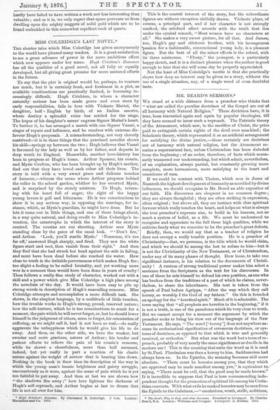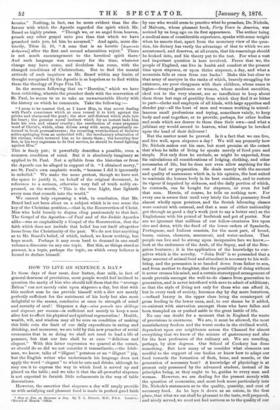MR. BEARD'S SERMONS.* WE stand at a wide distance from
a preacher who thinks that "what are called the peculiar doctrines of the Gospel are out of all harmony with Natural Religion." These doctrines have, it is true, been travestied again and again by popular theologies, till they have seemed to incur such a reproach. The Patristic theory of the Atonement, which saw, in the sacrifice of Christ, the price paid to extinguish certain rights of the devil over mankind ; the Scholastic theory, which represented it as an artificial arrangement for satisfying the divine justice,—these certainly are doctrines out of harmony with natural religion, but the Atonement re- mains a supernatural fact, unless Christendom has been deluded from the beginning ; of an order, therefore, of facts which neces- sarily transcend our understanding, but which admit, nevertheless, of an explanation, always partial, but constantly growing more complete, more harmonious, more satisfying to the heart and conscience of man.
If we could be content with Theism, which sees in Jesus of Nazareth the highest development of humanity as moulded by divine influences, we should recognise in Mr. Beard an able expositor of our faith. His discourses are eloquent in no common degree ; they are always thoughtful ; they are often striking in expression, often original ; but above all, they are instinct with that spiritual fervour which really touches the heart, and helps on what is always the true preacher's supreme aim, to build in his hearers, not so much a system of belief, as a life. We must be understood to recognise and appreciate to the full these high qualities, while we criticise freely what we conceive to be the preacher's great defeats.
Briefly, then, we would say that as a teacher of religion he does not occupy a really tenable position. He is a preacher of Christianity—that, we presume, is the title which he would claim, and which we should be among the last to refuse to him—but it is not the Christianity of the New Testament, or of Christendom, under any of its many phases of thought. How loose, to take one significant instance, is his relation to the documents of Christi- anity! A custom of strong traditional power makes him select a sentence from the Scriptures as the text for his discourses. In one of these he seta himself to defend his own position, as one who has broken from the traditions of a past of which he claims, never- theless, to share the inheritance. His text is taken from the speech of Paul before Agrippa, "After the way which they call heresy, so worship I the God of my fathers." On this is founded an apology for the "heretical spirit." Much of it is admirable. The terse saying that "all prophets are heretics in the beginning," if it is not a truth, is one of the paradoxes which lie very close to truth. But we cannot accept for a moment the argument by which the preacher seeks to bring his view out of the language of the New Testament. He says, "The word t heresy '] does not anywhere as- sume its ecclesiastical signification of erroneaus doctrines, or sys- tems of doctrines, as opposed to that which is true and generally received, or orthodox." But what was the word but a termof re- proach, probably of very nearly the same significance as dwells in its modern use? This is the meaning that suits the word as it is used by StPaul. Pharisaism was then a heresy to him. Sadduceeism had always been so. In the Epistles, the meaning becomes still more absolute. "There must be heresies among you, that they which are approved may be made manifest among you," is equivalent toi"." saying, "There must be evil, that the good may be made known'." It is incredible to suppose that Paul is here recommending inde- pendent thought for the promotion of spiritual life among his Corin- thian converts. With what evils he ranked heresies may be seen from the Epistle to the Galatians,—" emulations, wrath, strife, seditious,
• The Soul's Way Co God, and other Sermons. Preached In Liverpool. By Charles Beard, B.A. London : Williams and Nurgate. Liverpool: A. Holden. 1876. heresies." Nothing, in fact, can be more evident than the dis- favour with which the Apostle regarded the spirit which Mr. Beard so highly praises. "Though we, or an angel from heaven, preach any other gospel unto you than that which we have preached unto you, let him be accursed." And again, more dis- tinctly, Titus iii. 10, "A man that is an heretic [eirperizio irepogrov] after the first and second admonition reject." There is not much encouragement to the heretical spirit there.'
And such language was necessary for the time, whatever change may have come, and doubtless has come, with the changed conditions of Christendom. But to find the mental attitude of such inquirers as Mr. Beard within any limits of
thought( recognised by the Apostle is as hopeless as to find within them the theology of Pope Pius IX.
In the sermon following that on "Heretics," which we have been criticising, wherein the preacher deals with the conversion of St. Paul, he seems to us to take an unwarrantable liberty with the history on which he comments. Take the following :—
4' I seem to be nearest God, as I know Him, in that secret dealing with Paul's conscience which at once roused it to kick against the pricks and sharpened the goad ; the slow self-distrust which stole into his heart ; the genuine moral instinct which for an instant bade him hate his own and others' cruelty ; the recollection of some pregnant word of Christ's, which, often driven away with scorn, perpetually re- turned in fresh persuasiveness ; the recurring wretchedness of decisive action springing from an undecided will; the involuntary admiration of his victims, which tortured him as he smote them ; the haunting fear lest, in his very eagerness to do God service, he should be found fighting
against Him.' . .
Thin is finely put; it powerfully describes a possible, even a dorm:don condition of mind. But it is absolutely imaginary as
applied to St. Paul. Not a syllable from the historian or froni the Apostle can be alleged in support of it. "I obtained mercy," are St. Paul's own emphatic words, "because I did it ignorantly in unbelief." We make the same protest, though we have not the space to justify it, on behalf of the original document, in reference to a sermon, otherwise very fall of truth nobly ex- pressed, on the words, "This in the true Light, that lighteth every man that cometh into the world."
We cannot help expressing a wish, in conclusion, that Mr.
Beard had not been silent on a subject which is in one sense the key of the Christian position,—that is, the Resurrection of Christ. Men who hold loosely to dogma cling passionately to that fact. The Gospel of the Apostles—of Paul and of the Judaic Apostles alike—was so emphatically a Gospel of the Resurrection, that the faith which does not include that belief has cut itself altogether loose from the Christianity of the past. We do not hint anything as to Mr. Beard's belief, of which, indeed, we know nothing, but hope much. Perhaps it may seem hard to demand in one small volume a discourse on any one topic. But this, as things stand at present, is a topic, perhaps the topic, on which every believer is bound to declare himself.



































 Previous page
Previous page